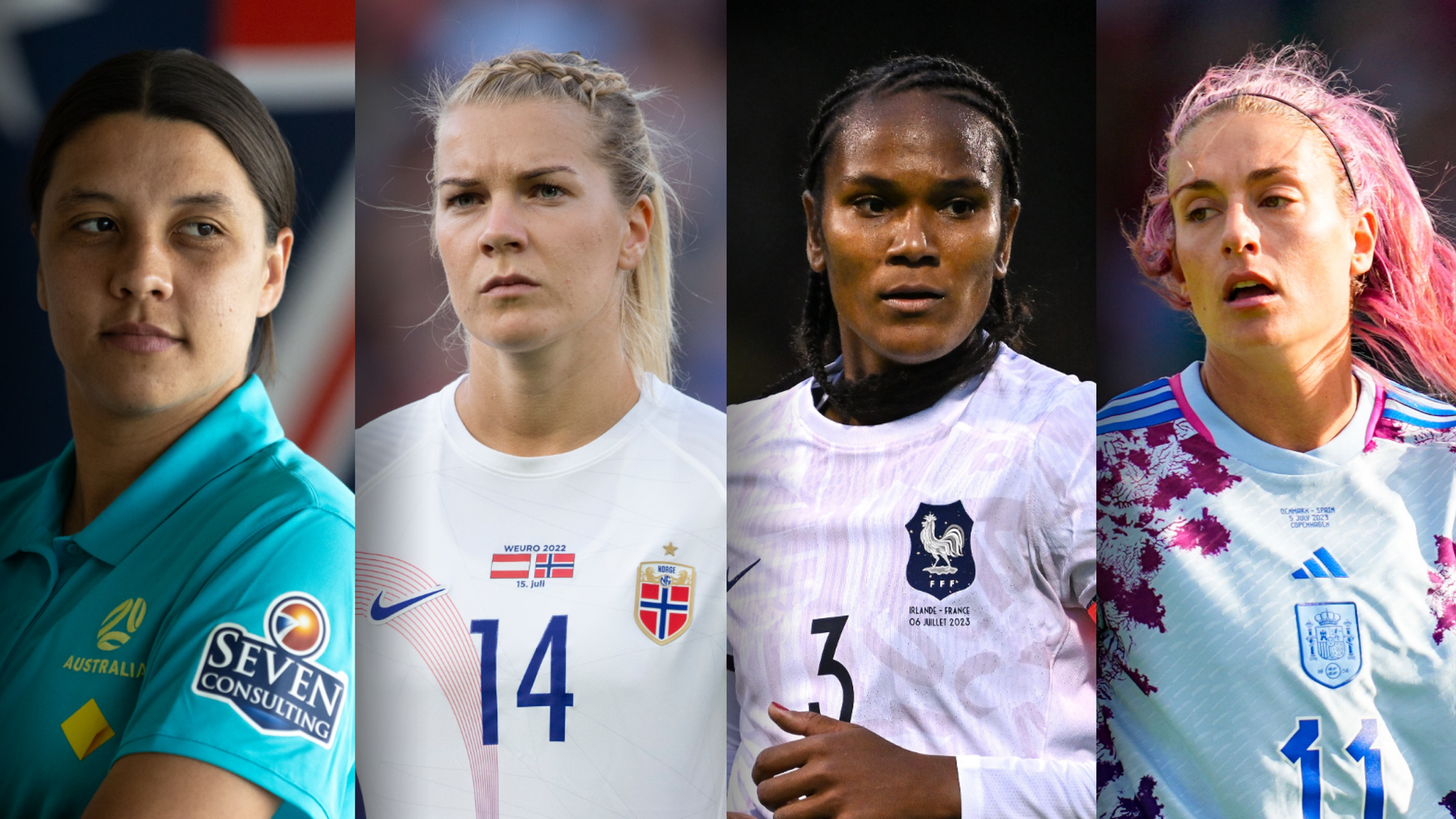Women's football: From watching at sidelines to aiming for world stage
- Published
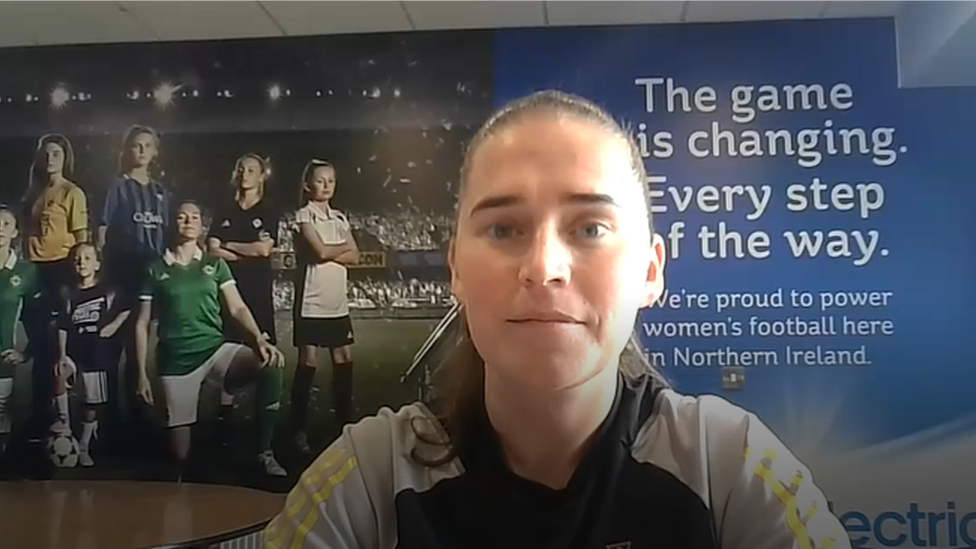
Lauren Moore says the IFA wants to help girls develop a life-long love for playing football
More young girls in Northern Ireland will see a pathway to a career as a professional footballer thanks to the publicity around the Women's World Cup.
That is the view of Lauren Moore, women's football development manager at the Irish Football Association (IFA).
Her job is to promote and increase female participation in football at all levels.
Although Northern Ireland internationals missed out on a place in the 2023 finals, the involvement of the Republic of Ireland and England has provided plenty of inspiration for future stars.
"There's not going to be a day this month where you don't turn on mainstream TV and see a women's football match live," Ms Moore told BBC News NI.
She adds mainstream coverage is so important to how girls view the sport and their personal prospects.
"I think back to whenever I was a young girl," she recalls. "I had two brothers so I had no choice - my outlet was going and playing football with my brothers."
Despite her passion for the game, their local football club did not provide facilities for girls to join teams when she was a teenager.
So her first experience of their club was having to stand at the side of the pitch and watch her youngest brother play, even though she was nearly seven years older than him.
"He was under-nines, and me standing kicking a ball around, but with no opportunities and not knowing where the opportunities were," Ms Moore explains.
"And now, with the interest in the media and the way everything is branded and publicised so much more, these young girls can see a future.
"They can say: 'Well OK I can potentially become a footballer and it is an option for me', whereas maybe not so long ago it wasn't."
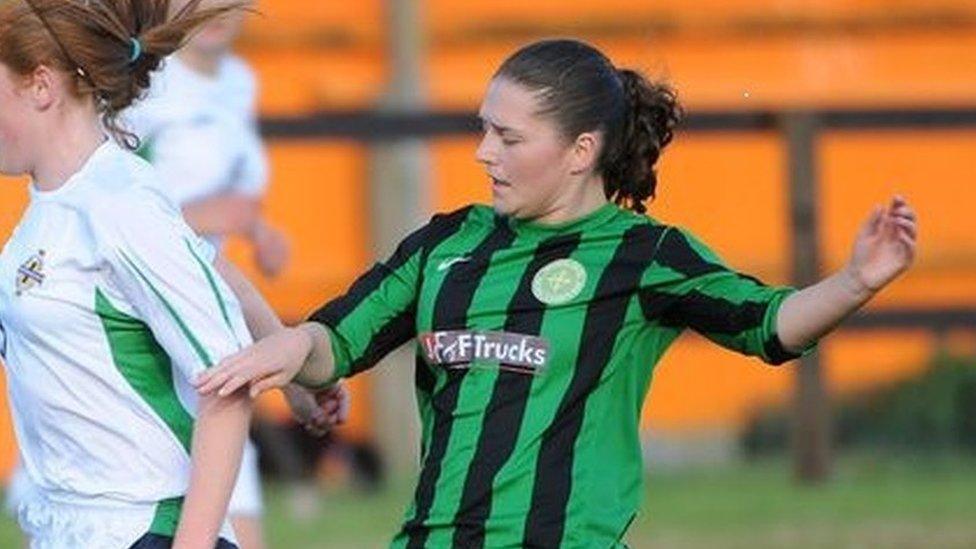
Lauren Moore in action on the pitch during her competitive career
In 2019, the IFA launched ambitions plans to boost female participation in football across Northern Ireland by publishing its Girls' and Women's Strategy, external.
One of its key targets was to double the number of registered female players over a five-year period.
Since then, Northern Ireland's international team made it to their first ever major international tournament - the UEFA Women's EURO 2022.
"Off the back of the Euros success and the success around us - England doing well and with Republic of Ireland qualifying as well and heading to the World Cup - now we're able to see the growth in the girls' game," Ms Moore says.
She also highlighted the efforts of the Electric Ireland Shooting Stars programme, external which aims to develop fundamental skills in girls aged four to 11 in a friendly, fun-filled environment.
'Mummy, did you get me into football?'
Ballynahinch Olympic FC in County Down is among the clubs that have seen a significant upsurge in female competition since the Euros.
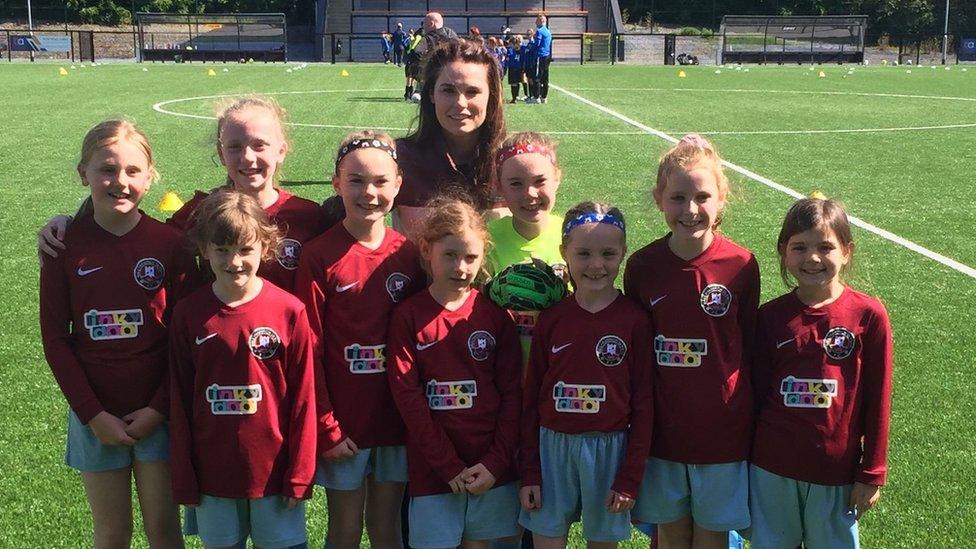
Coach Emma Gordon with Ballynahinch Olympic FC's Under-11s girls' team
It set up its first all-girls' youth team in October 2022 and now has more than 100 female players across all age groups, according to coach Emma Gordon.
"It's been a massive explosion for the club in the last year and a half," she says.
Ms Gordon is a Gaelic Athletic Association (GAA) player who had no background in football coaching before she joined Ballynahinch Olympic.
"I have four daughters, the youngest of the four was particularly keen to get involved in soccer," she explains.
"She kept saying: 'Mummy, did you get me into football?'"
'Goalkeeper, centre back and striker'
Her youngest child, Ava, was in Primary Two when she announced she wanted to play football. But Ava had to join a boys' team at the Ballynahinch club as there was not one for girls of her age. And that was just last year.
When Ava's older sisters realised the baby of the family could play with the boys, they also joined the club.
Soon, Ballynahinch parents decided there were enough girls to set up a separate squad.
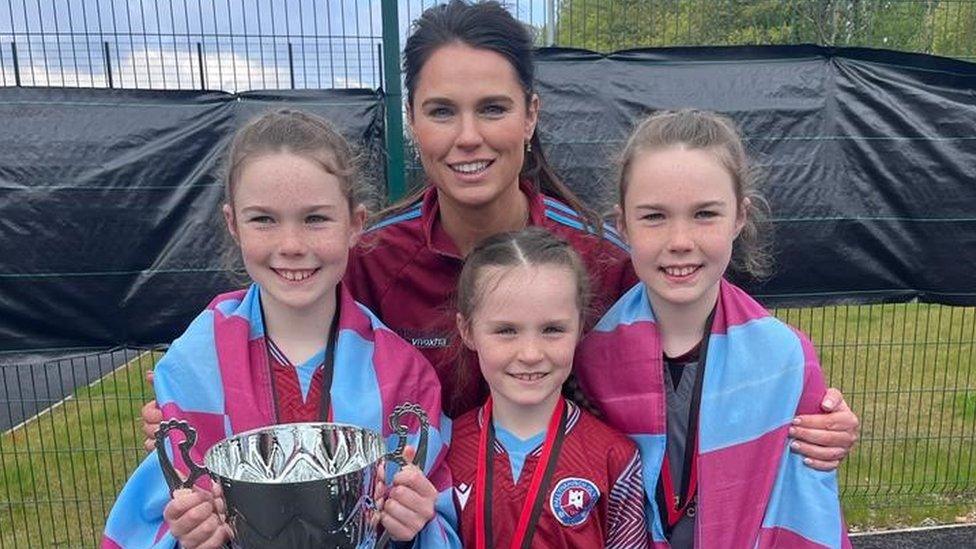
Emma Gordon says three of her four daughters play for Ballynahinch: "So we have a goal keeper, a centre back and a striker."
"I think at the time, with the Women's Euros being on, it really helped boost everything," Ms Gordon says.
"We could have probably counted on your fingers how many girls were dotted around the club within boys' teams, but once the girls' got a feel for girls'-only sides, they just kept coming."
'Female role models'
Last week their Under-11s girls' squad made it into the Foyle Cup final, an impressive debut on their first trip to the prestigious youth tournament.
Ballynahinch, once a male-dominated club, strongly supports the development of girls' teams and encourages new coaches to achieve formal qualifications.
"Coaching for me has kind of taken over my life," Ms Gordon says.
"Watching the World Cup and seeing so many females in management roles, that only does good for encouraging women especially to get involved.
"Particularly for me, positive female role models are a big thing that I want for my children and they'll look in their locality for people to look up to," she explains.
"So the more people we can get involved with that within our local clubs will only help."
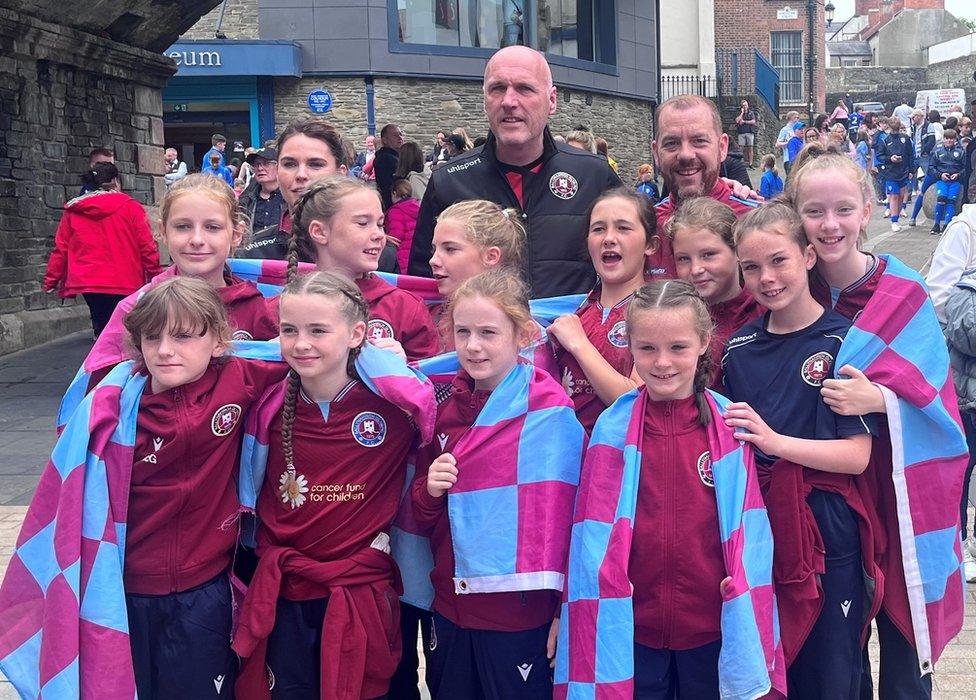
The Under-11s girls' team at the Foyle Cup with manager Gareth McGreevy and coaches Anthony Russell and Emma Gordon
Clubs must now capitalise on the attention the women's game is receiving during the World Cup, according to the IFA.
Ms Moore said the plan is to expand current structures so that every area in Northern Ireland provides "single age band" facilities for girls and a regional league they can progress into.
"A lot of focus is on ensuring that these young girls have football opportunities that are close to them, that they're not traveling an hour to play in a league that's a bit further out," she explains.
The intention is to provide a "pathway of footballing opportunities to keep them interested and help them fall in love with the game life long".
"Not everybody will go on to play for Northern Ireland and not everybody will go on to play in structured competitive leagues," Ms Moore adds.
"But we can't forget about the impact that we are having just in general on those little ones coming in and their confidence and their self-esteem and how they develop, their friendships and all of that."
Related topics
- Published26 July 2023
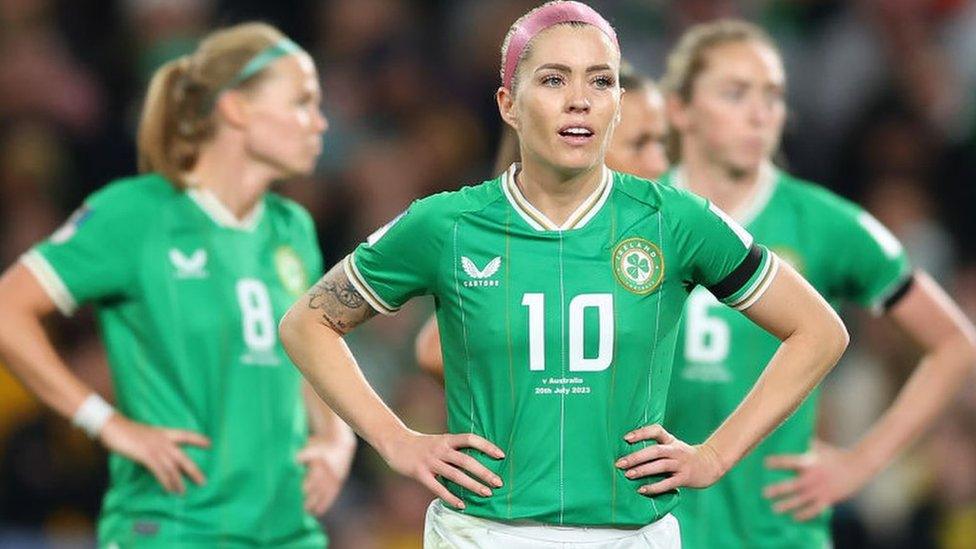
- Attribution
- Published18 July 2023
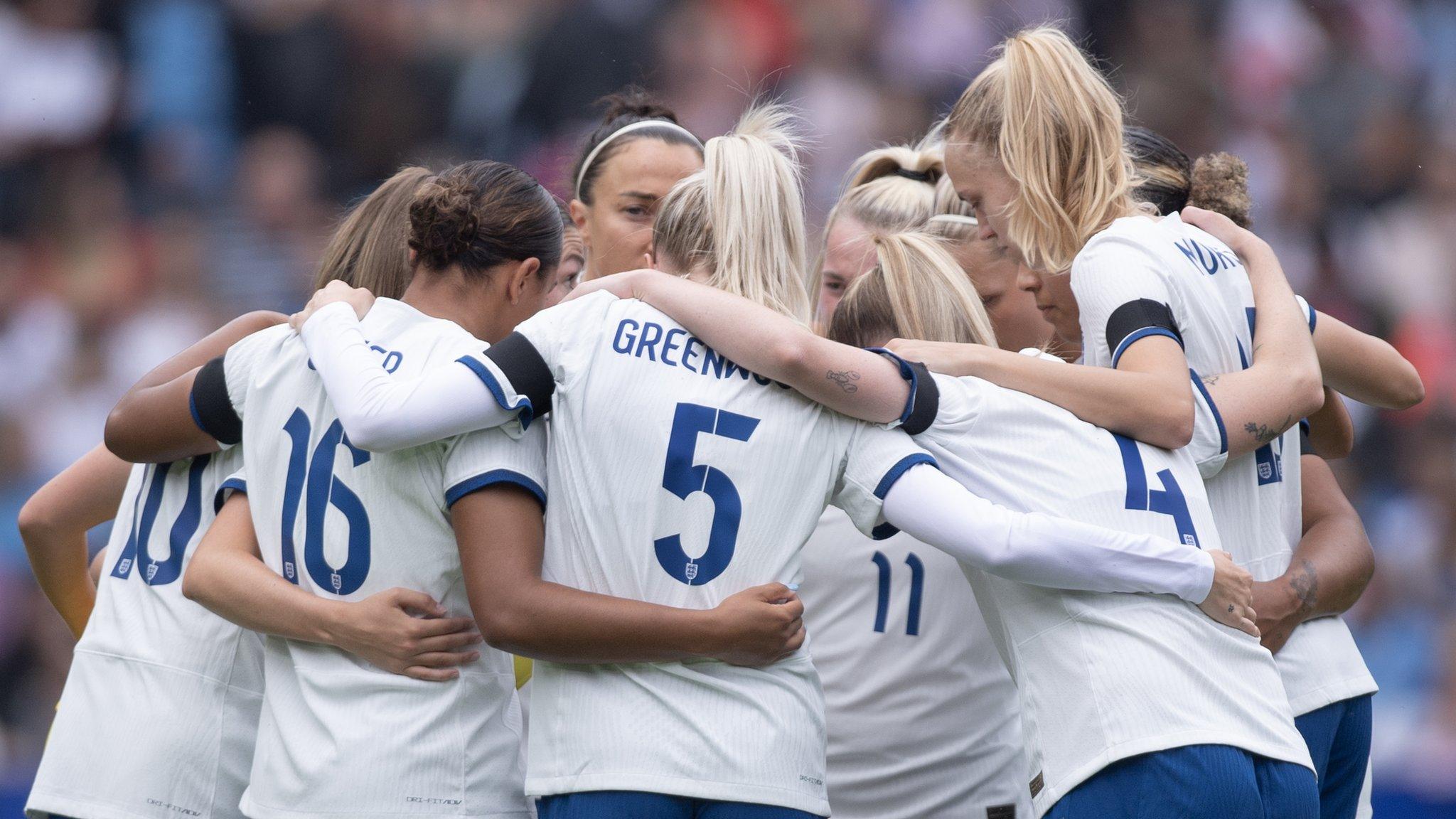
- Attribution
- Published16 July 2023
